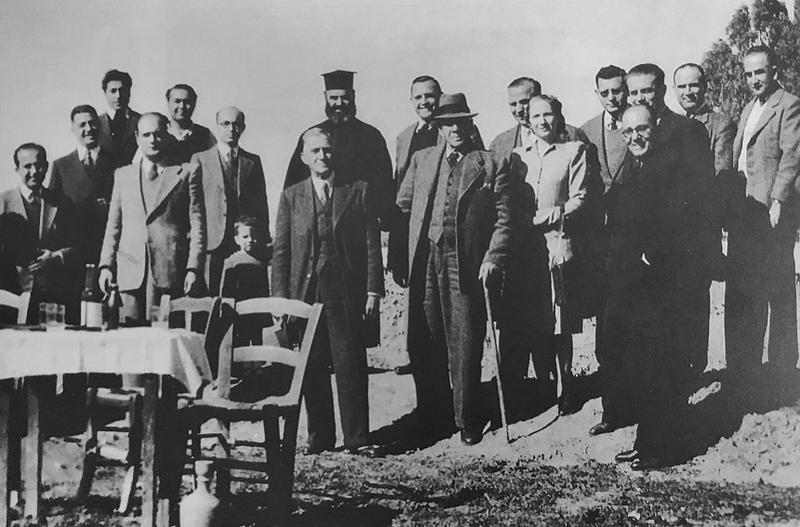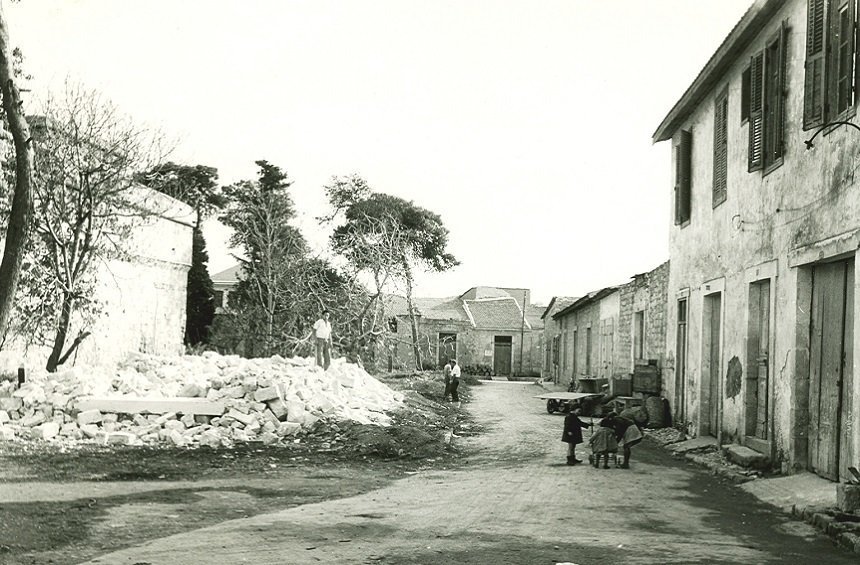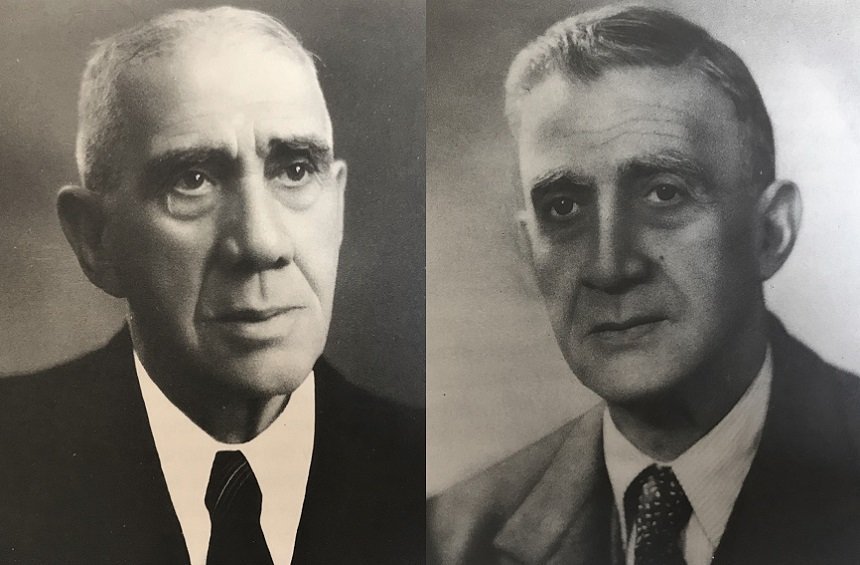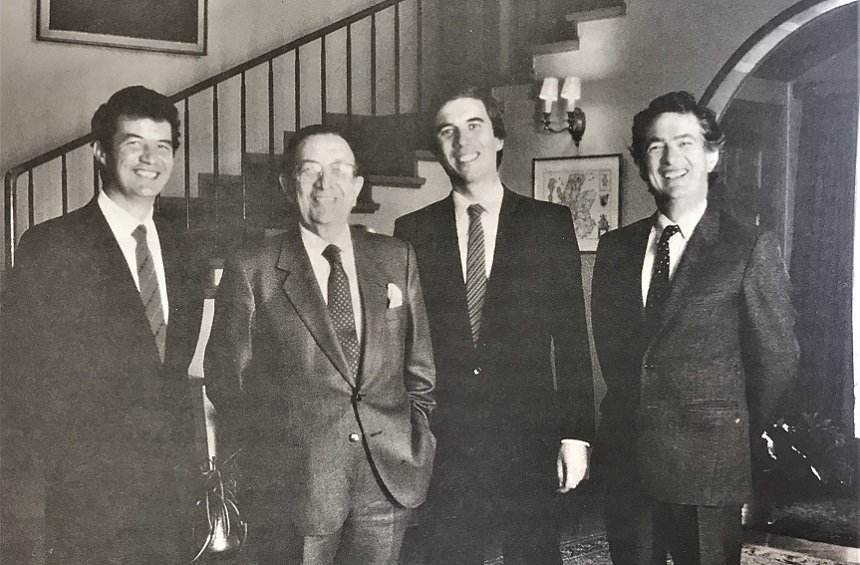
Many years ago near the end of the 19th century, a simple farmer decided to hit the road and head to the city, like many others, to sell his produce. As Panagis Sykas made his way back and forth between Laeia and Limassol, selling fruits, vegetables and other products from his village, no one could have imagined (not even himself) that he would one day be initiating a large, internationally renowned business group based in Limassol.
Panagis, as he was known, did not study, nor had he any specialized knowledge of the market. He was, however, a businessman in heart, who bequeathed that same way of thinking to his descendants, leaving behind all the necessary conditions for the foundation of a business that would pass from one generation to the next. As Panagis would often visit Limassol from Lania, his customers began calling him Lanitis and this is how he became known when he decided to broaden his business in the city.
Following his example, his sons, Nikolaos P. Lanitis and Costas P. Lanitis, became the core around which this business group was built. Without any other scientific tools, based only on the empirical knowledge passed on by their father, they founded N. P. Lanitis and Co. in 1896, at a time when Limassol was rapidly developing into a commercial center of the eastern Mediterranean.
The way in which they handled the financial matters of the company was an important aspect of its success. They even established a rule against gambling and immoral acts, in order to ensure that none of the partners would put the company in jeopardy due to their own personal issues.
Carobs from Cyprus were famous in neighbouring countries (such as Turkey, Egypt and Syria) and they become a large part of the company’s portfolio. The carob warehouses by the Medieval Castle, just a few steps from the port pay tribute to that era, named the Carob Mill to this day.

The stone-built buildings on the right side of the photo were used as carob warehouses.
Even though the agricultural produce trade was what they knew best thanks to their father, Nikolaos and Costas became involved in several other activities, trying new things that they believed had prospect at the time. This resulted in the expansion of the company into many different sectors and activities.

Nikolaos P. Lanitis (left) and Costas P. Lanitis (right), the 2 sons fof Panagis Sykas, inherited and evolved the business instinct of their father, founding N. P. Lanitis & Co Ltd.
Nikolas and Costas were very different from each other, though this never became a reason for conflict. Instead, their characters complemented each other, and when the resourcefulness of Nikolaos would meet the organizing mind of Costas, this lead to successful ventures. Of course, this does not mean that were always able to avoid failures.
Soon after World War I, the 2 brothers lost almost their entire fortune. The company managed to recover, however, thanks to the fact that the brothers made sure to deposit the largest part of the profits in the corporate fund, instead of their personal accounts.
Their first attempt to enter the shipping industry ended in failure, as the company they founded, with just 3 ships at the beginning of the 20th century, ended up closing. Nevertheless, their interest in shipping did not fade, and they eventually founded “Amathus” in 1943, a shipping company that evolved into a significant travel agency in the 1960s.

The building of the People’s Savings Bank at Athinon street, in the historical city center.
The increasing rates in the shipping and trading industry in Limassol were a reason for many foreign banks to open in the city, aiming to serve the people associated with these activities. Thus, in 1901, the 2 brothers were joined by other men in Limassol to establish the Limassol People’s Savings Bank, which eventually became the Popular Bank of Cyprus.

KEO (Cyprus Wines Limited) has been one of the most important industries in the city. Beyond employing thousands of workers, it also played a significant role supporting vineyard crops in Limassol.
The collaboration between Greek Company of Chemicals and Fertilizers in 1912 offered expansion into a new field associated with agricultural fertilizers. It was also the first step towards the foundation of a company in 1927 known to this day as KEO, in partnership with the owners of that same Greek company. N. P. Lanitis was a founding partner of KEO, but sold its shares to the Greek partner A. Bodosakis, leaving the business for good in 1951.
No matter how much Nikolaos and Costas would reach for new ventures, they never strayed far from agricultural activities, the first business they were introduced to.
Thus, in 1933 they bought some farming land in Alektora and Kouklia, and in 1936 they bought an additional 3,800,000 square meters of land west of Limassol. The land in Kouklia has now been transformed into the prestigious Aphrodite Hills Golf Resort. The land west of Limassol is where the facilities of the Fasouri Watermania Waterpark are established, following a lengthy battle to remove a large number of snakes and millions of mosquitos, to create a space suitable for humans.
The company farm has been a point of reference for the Lanitis Group from the very beginning to this day. In fact, it was something Evagoras Lanitis paid much attention to, and he was the one mainly responsible for the turn to citrus farming.
Evagoras, the son of Costas P. Lanitis who particularly admired his uncle Nikolaos P. Lanitis, was next in line to carry the baton of the family business. Evagoras Lanitis represented a new generation, with the added asset of an academic education from Cambridge, along with a great deal of practical experience,

Evagoras Lanitis (left) as a young man, studying in London.
During the years 1939 – 1945, before Evagoras went to the UK to study, he worked alongside his father and uncle, absorbing all the valuable lessons he could go on to use in the future. This was around the time when he became particularly fond of the farm as well. At the same time, however, he continuously kept reaching for new things, among which the most daring was probably the construction of the Amathus Hotel (of which the group still holds 25% of its shares).

After the farm turned to the production of citrus fruits, a packing unit was constructed in 1964, and a second one followed in 1985.
Evagoras Lanitis always made sure to refer to each of his employees by name, both at the farm and in the company’s offices, making himself approachable and amenable in all his encounters. He would greet them with a smile and a joke, always lightening up the mood, and would even interrupt worktime for a break, bringing snacks and treats for everyone.
There was a time when the farm was subjected to a series of robberies by people in the surrounding areas. He decided to solve this issue by hiring the thieves as guards. Of course, the robberies stopped immediately.
Being this approachable in his everyday encounters with people resulted in everyone calling him by his first name, Mr Evagoras. This is the same address everyone uses with his 3 sons today, Costas, Marios and Plato, who are his successors in the company.

Evagoras Lanitis with his sons (from right to left), Costas, Marios and Plato, who followed his footsteps in managing the group, after some time working as employees receiving a typical salary.
Since 1945, with the founding of Cybarco Ltd, the group moved into the construction sector. In fact, Evagoras Lanitis himself was very particular about the importance of infrastructure for the development of the economy.
He considered the creation of a proper road connecting Limassol city with the countryside to be of utmost importance, as it would enable people to travel with ease to the country and help keep the rural economy afloat.
He also firmly believed that the road connecting Nicosia and Limassol was unfit, as its poor conditions before improvement works had begun to take place were the reason for many car accident deaths .

Amathus Beach Hotel, one of Limassol's first seaside hotels, was inaugurated in October 1973, at a time when the success of such a business in Limassol was uncertain, due to the inexistence of tourism in the city. Evagoras Lanitis wanted a 5-star hotel in Limassol to encourage the development of the tourism industry, even though such a venture had better prospects in Famagusta at the time.
Evagoras Lanitis was never involved in politics. The company's warehouses were used to keep and distribute arms during the Independence Struggle of ’55 – ’59, and Evagoras joined other lawyers to oppose to a collective punishment fee of 35,000 pounds, imposed by the British administration upon the people of Limassol.
In 1974, however, he accepted the proposal of Glafkos Clerides to become a minister. This proposal was the result of Clerides' search for people who were impartial in the conflict between Makarios and Grivas to serve as ministers. Thus, from August 1974 to January 1975, Evagoras was head of the Ministry of Agricultures and Natural Resources, as well as the Ministry of Commerce and Industry, using his experience as a businessman to organize local production, after the loss of 40% of the island's land.

Limassol’s Greek High school is one of the largest donations by the Lanitis family to the local community. This piece of land was donated by Nikolaos P. Lanitis for the construction of the school, which was then named after him, known to this day as the Laniteio. Even though it was probably the largest, this was not the family’s only contribution to education and the city’s youth, largely due to the fact that the 2 brothers of N. P. Lanitis Ltd were not fortunate to receive an education of their own.
Besides being at the core of a large business group, the Lanitis family has also been an integral part of the local community in Limassol. Inevitably, the work of their companies and the actions of each of the family members have always had an immediate effect on the city’s course, contributing greatly to the local economy with the employment of hundreds of employees who worked in the group’s companies. In 2001, the children of Evagoras and Kathleen Lanitis, Costas, Marios, Plato and Isabell, aimed to reinforce the connection of the family and the group with the community through the establishment of the Evagoras and Kathleen Lanitis Foundation, which organizes cultural and educational events.
While the group’s activities have expanded across many countries abroad (undertaking large-scale projects such as the airport and theatre in Bahrain), its presence in Limassol still has a formative role. Turning the former Carob Mill into a recreation area, with dining venues, has breathed new life into the Castle Square, making it one of the city’s most important sights. The construction of the Limassol Marina via a joint venture of which Cybarco is a main shareholder has also been crucial to the construction of Limassol’s image today. At the same time, the descendants of Panagis, Nikolaos, Costas and Evagoras Lanitis, are still living their lives like true Limassolians, visioning and planning for the future of their city (and beyond), through new business ventures.
Information: «Evagoras C. Lanitis 1921 - 1992», Pambos Kaskanis, Evagoras and Kathleen Lanitis Foundation, Limassol Historical Archives
The building of the People’s Savings Bank on Athinon Street, in the historical city center.
* NOTE: The tributes of the Project "History of Limassol" present information that has emerged from historical research thus far. Any new data is embedded into the tributes, once it has been confirmed.